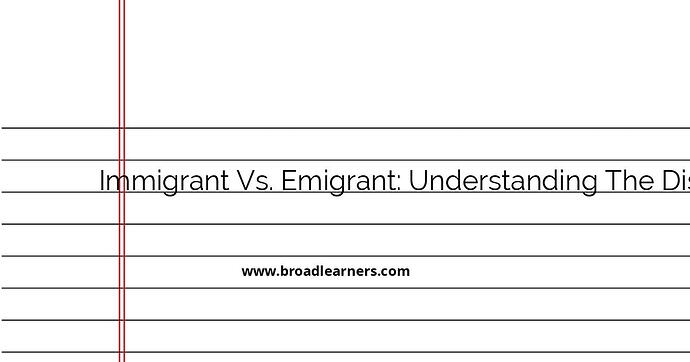The distinction between the terms 'immigrant' and 'emigrant' often causes confusion, particularly for those less familiar with the nuances of the English language. Understanding these terms is essential as they capture different perspectives of movement between countries or regions.
- Immigrant
- An 'immigrant' is a person who comes to a new country from another to live permanently. This term is used from the perspective of the destination country. When discussing issues, policies, or narratives from the viewpoint of the host nation, the term 'immigrant' is appropriate.
- Emigrant
- An 'emigrant,' on the other hand, is a person who leaves their own country to settle in another. This term is used from the perspective of the country of origin. When emphasizing departure from the home country, 'emigrant' is the correct term to use.
Example:
After securing a job offer, Maria decided to become an immigrant and moved to Canada to start her new life.
Example:
John was an emigrant who left Ireland in search of better opportunities in Australia, ultimately seeking a new beginning.
To further clarify, consider the following:
- If you are discussing someone entering Germany from Italy, you call them an 'immigrant' in Germany.
- If you are discussing a person leaving Italy to move to Germany, you would refer to them as an 'emigrant' from Italy.
- Both terms can describe the same person's move, but from opposite perspectives depending on the focus of the conversation.
Illustrative Examples:
-
"Hundreds of thousands of immigrants arrive in the United States each year, hoping to benefit from educational and professional opportunities."
In this example, the focus is on individuals moving into the country, thus the term 'immigrant' is applied.
-
"The number of emigrants leaving Mexico has decreased as the country's economy continues to improve."
Here, 'emigrants' are those leaving Mexico, placing emphasis on the point of departure.
Understanding these distinctions enhances communication clarity, especially in discussions about global migration trends. Whether you are reading articles, crafting policies, or writing about migration, using the correct term reveals the perspective and detail of movement accurately.
Did I miss anything? Respond below
